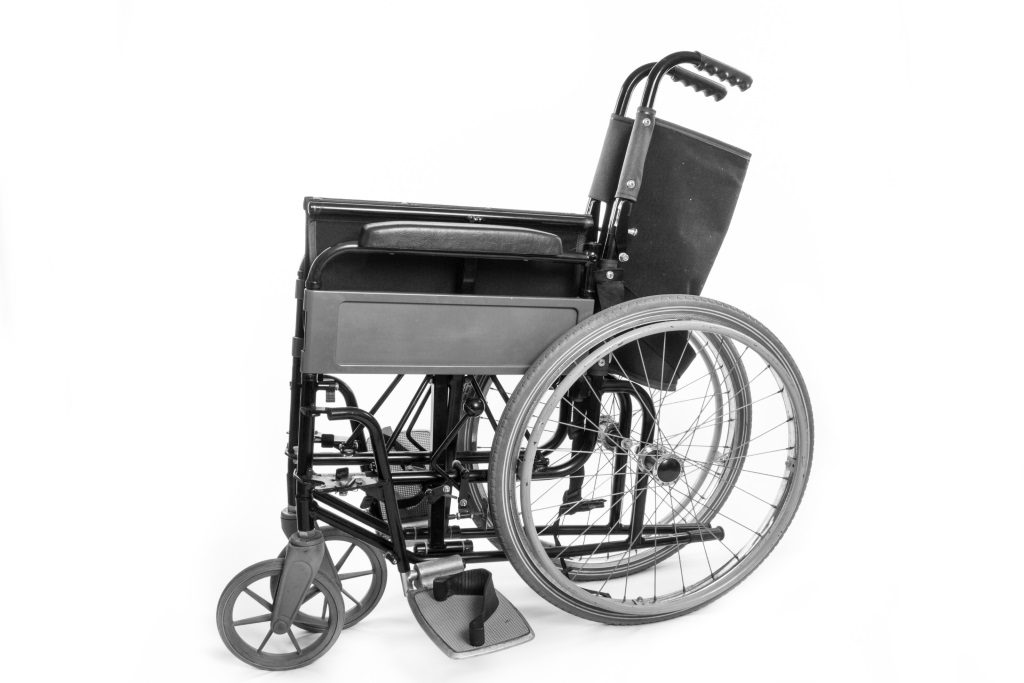A Wheelchair Is Not a Trampoline
And Republican food share proposal won’t help disabled and poor people.
“Public assistance should be a trampoline, not a hammock,” read the title of Governor Walker’s press release touting work on a package of bills introduced in a Legislative Special Session. The bills made changes to certain programs targeted at helping those living in poverty.
During the recent Senate debate, proponents of the bills declared the best road out of poverty was a job. No one in the Senate disagreed. However, what these bills really do is KEEP people in poverty and make a few companies richer while providing little accountability.
The assumption of the hammock metaphor is that people are lazy and just need a kick to get moving. Another assumption is that fraud is rampant. Both assumptions are false. FoodShare is heavily scrutinized to ensure compliance. Wisconsin has an error rate around one percent.
Most people who use FoodShare or BadgerCare do so short term. According to Kaiser Family Foundation, 60% of non-elderly folks who use Medicaid are already working. Another third are in school, ill or caring for someone in need.
According to David Lee of Hunger Task Force in Wisconsin, about two-thirds of those who get FoodShare are seniors, disabled, and children – people who cannot work. Of the remaining third, half are already working. Many others are caregivers – for either the elderly, disabled or children.
Part of the Special Session plan is to make it harder to get FoodShare and BadgerCare. Families may have to sell their home if it’s more than 200% of average state value. Farmers may have to sell livestock, equipment and farm buildings. Disabled folks might lose their accessible van if it’s worth over $10,000.
These rules fly in the face of common sense. If we want a farmer to do better, or a wheelchair bound person to succeed why would we make them sell items essential to their livelihood?
Lawmakers heard stories of FSET companies creating incentives for job counselors to get people into low wage jobs as soon as possible. For example, we heard about a young woman who wanted to get her GED to improve her ability to get work. Instead, the FSET job counselor sent her to a minimum wage fast food job.
The Legislative Fiscal Bureau (LFB) reported that FSET participants, who gained employment in December of 2016, made an average of $12.19 an hour and worked an average of 34 hours a week. The LFB reported that participants with those wages and hours worked would still be eligible for FoodShare.
Further, the LFB reported on a string of problems with FSET. Costs per person per month were more than double the original budget estimate. Federal inspections turned up problems in Milwaukee, including civil rights violations, the lack of individualized services, and restricted education and training opportunities. Corrective actions and recommendations were slow or not completed. Despite three years of problems, the state made only one onsite visit.
Despite such poor performance and lack of evaluation, state officials awarded bonuses. The Department of Health Services gave “pay for performance” bonus money to all but one of the 11 FSET companies for “accuracy” and “timely completion of quarterly reports” – requirements FSET companies should meet at a minimum.
Unbelievably, Special Session Assembly Bill 6 more than quadrupled these “pay for performance” bonuses to the FSET companies.
Every group that works with those struggling to gain economic stability opposed these Special Session bills. Their thoughtful and compelling testimony clearly demonstrated that people want to move out of poverty and off government assistance. All they need are the tools to help them achieve their dream.
A wheelchair is not a hammock, but essential equipment. A warm house, food, health care and education are not a hammock but rather the essential tools to help people get that job that moves them out of poverty.
The measure of a civilized society is how we treat those in need. The Governor’s plan cuts the springs holding up the trampoline just as a person jumps.
For many, life is very difficult. When we reach out helping hands to those in need, we do our part to make not only their lives better, but ours as well.
State Sen. Kathleen Vinehout, D-Alma, is a member of the Wisconsin state Senate.
Op-Ed
-
Unlocking Milwaukee’s Potential Through Smart Zoning Reform
 Jul 5th, 2024 by Ariam Kesete
Jul 5th, 2024 by Ariam Kesete
-
We Energies’ Natural Gas Plans Are A Mistake
 Jun 28th, 2024 by John Imes
Jun 28th, 2024 by John Imes
-
Milwaukee Needs New Kind of School Board
 Jun 26th, 2024 by Jordan Morales
Jun 26th, 2024 by Jordan Morales























In the past three decades, the number of Americans who are on disability has skyrocketed. The rise has come even as medical advances have allowed many more people to remain on the job, and new laws have banned workplace discrimination against the disabled. Every month, 14 million people now get a disability check from the government.
http://apps.npr.org/unfit-for-work/
But disability has also become a de facto welfare program for people without a lot of education or job skills. But it wasn’t supposed to serve this purpose; it’s not a retraining program designed to get people back onto their feet. Once people go onto disability, they almost never go back to work. Fewer than 1 percent of those who were on the federal program for disabled workers at the beginning of 2011 have returned to the workforce since then, one economist told me.
http://apps.npr.org/unfit-for-work/
Troll, you said you heard that “fewer than 1% of those were on the federal program for disabled workers at the beginning of 2011 have returned to the workforce since then”.
Do you have a source for that claim? Also, what exactly do you mean by “the federal program for disabled workers”? Do you mean Social Security Disability? If so, I found very different data.
I found a study saying workers who, in 1996, started collecting Social Security Disability before age 40, 46% had gone back to work (for at least a while) by 2006. The numbers were lower for older workers but averaged 28% for all ages.
https://www.ssa.gov/disabilityresearch/documents/TTW5_Brief_2_DIcohort_REV2.pdf
Use some common sense here. Those on SSI Disability are not temporary status disabilities but, permanent. They tend to not improve with age but get worst.
I’m so surprised there is a rise in people on disabilities!
It’s not like the country hasn’t doubled in size in the last 40 years. Plus, those boomers being the largest generation, well, many have worked their entire lives. There’s a greater risk of a disability to an older person.
Connect the dots.
Republican philosophy in a nutshell. Afflict the afflicted and comfort the comfortable ie blame tje poor while handing billionaires and corporations obscene tax favors and corporate welfare. Life long Career Politicians like Scott Walker are by far and away the biggest Big Government moochers in the entire state.
Dump Walker 2018